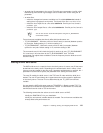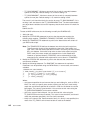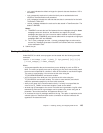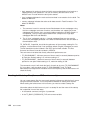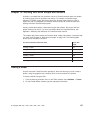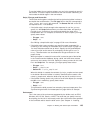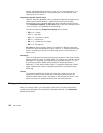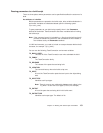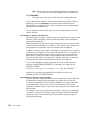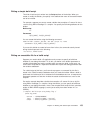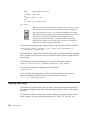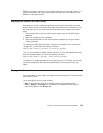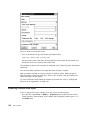To use the builder from a previous release, you can link to a part that uses it in
that release. This action copies the builder to the new release. Otherwise, you
must create the builder again in the new release.
Script, File type, and Source file
These fields work together to define the build script that the builder invokes to
accomplish the transformation. (The File type field on the GUI corresponds to
-text, -binary, and -none in the command. The Source file field on the GUI
corresponds to the -from attribute.)
v If the build script is simple enough to be expressed in one line, you can
specify it in the Script attribute when you create the builder, and specify a
file type of none. At minimum, the script must specify the name of the
transformation tool. For example, to invoke the C Set/2 compiler, you might
specify these values:
– File type - none
– Script - icc
See “Writing a simple build script” on page 153 for more information.
v If the build script is more complex, you must first create a separate file
containing it; see “Writing an executable file for a build script” on page 153
for more information about how to write it. Specify the fully qualified path
name of your file as the source file, and specify the file type as text or
binary. TeamConnection can also detect the file type and store it in the
proper format.
When the builder is created, this source file is stored as part of the builder
in the TeamConnection database; during a build, the build server creates
and runs a local version of this file. Specify the name you want for this local
file in the Script field. For example, you might specify these values:
– File type - text
– Script - c_compile.cmd
– Source file - c:\src\c_compile.cmd
When this builder is created, the contents of c:\src\c_compile.cmd are stored
in the builder. When this builder is invoked, TeamConnection creates a file
named c_compile.cmd, writes the build script into this file, and then runs it.
v If the builder is being used to only collect a set of build objects (for example,
the ALL: rule in makefiles), specify these values:
– File type - none
– Script - null
This prevents the build process from extracting input and output parts. See
“Synchronizing the build of unrelated parts” on page 196 for an example.
Environment
This is the name of the environment supported by the builder, such as OS/2,
Windows, AIX, HP-UX, Solaris, or MVS. The value that you specify here can
be anything you like, but it must exactly match the environment value specified
in the command used to start the build server. (See “Chapter 11. Installing,
Chapter 12. Working with build scripts and builders 149



